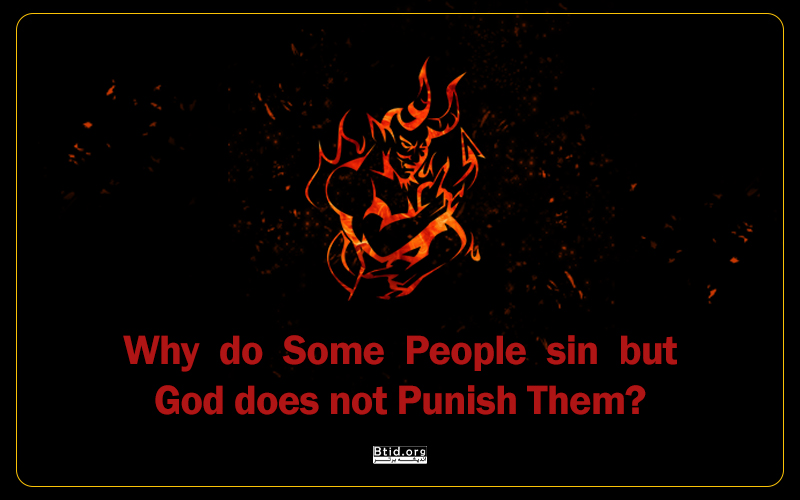-

Why do Some people Sin but God does not Punish Them?
Some people commit injustice and sin thinking that Allah will not punish them in this world. In this article, we are going to explain this question from a certain story as follows:
My wife wanted unconditional freedom and no hijab, and by taking money and a divorce attorney, and forgiving the rest of the dowry, she got her divorce and left our two sons, 3 and 6 years old, at first she was wearing a hijab (chador), but now she is a low veil, and in every meeting she has with the children, she creates a lot of problems for me.
I have been cursing for a year but nothing happens! the question is, why do some people commit any injustice and sin in the world and not see any punishment or trouble? but some people see the result in the world with the smallest sin they commit?!
According to the Quranic verses and hadiths, the main place of punishment, and reward is in the hereafter, and the world is the place of action.
Allah this proves by saying;
"He, who created death and life that He may test you [to see] which of you is best in conduct. And He is the All-mighty, the All-forgiving.[1]
In another verse Allah says:
"The Gardens of Eden, with streams running in them, to abide in them [forever], and that is the reward of him who keeps pure.[2]
Imam Ali said:
"Today (the world) is action and work without seeing the result of our deeds, and tomorrow (the world of the hereafter) is counting and seeing the result of deeds, without doing anything there".[3]
From an intellectual point of view, this issue is logical and acceptable; because if everyone who commits a sin in this world is to be punished in this world, most of the people on the planet must perish! The Holy Qur’an also mentions this fact about injustice and sin:
Were Allah to take mankind to task for their wrongdoing, He would not leave any living being upon it. But He respites them until a specified time; so when their time comes they shall not defer it by a single hour nor shall they advance it.[4]
In addition, the fact that punishment in this world is not compatible with the philosophy of resurrection and human creation; Because in that case, all people would be forced to accept religion and practice it; Therefore, God Almighty has provided many opportunities and facilities for people to choose their life path freely and freely.
Of course, it is not the case that there is no punishment or reward for people's actions in the world; Rather, God Almighty shows some punishments or rewards for some actions in this world for the punishment of injustice and sins and encouragement or...
Qur’an said about this:
"Corruption has appeared in land and sea because of the doings of the people's hands, that He may make them taste something of what they have done, so that they may come back.[5]
"If the people of the towns had been faithful and Godwary, We would have opened to them blessings from the heaven and the earth. But they denied; so We seized them because of what they used to earn.][6]
Especially towards the believers who, in order to cleanse themselves from their sins in this world and to reduce their problems in the resurrection and the Hereafter, he places the greatest punishments on them in this world so that they can appear before God with a lighter case.[7]
References:
[1].«فَإِنَّ الْیَوْمَ عَمَلٌ وَ لَا حِسَابَ وَ إِنَّ غَداً حِسَابٌ وَ لَا عَمَل»
[2] Taha, 20:76, «جَنَّاتُ عَدْنٍ تَجْری مِنْ تَحْتِهَا الْأَنْهارُ خالِدینَ فیها وَ ذلِکَ جَزاءُ مَنْ تَزَکَّى»
[3] Kalini, Muhammad bin Yaqub, Kafi, vol. 8, p. 58, Tehran, Dar al-Katb al-Islamiyya, 4th edition, 1407 AH, «فَإِنَّ الْیَوْمَ عَمَلٌ وَ لَا حِسَابَ وَ إِنَّ غَداً حِسَابٌ وَ لَا عَمَل»
[4] Nahl, 16:61,
وَ لَوْ یُؤاخِذُ اللَّهُ النَّاسَ بِظُلْمِهِمْ ما تَرَکَ عَلَیْها مِنْ دَابَّةٍ وَ لکِنْ یُؤَخِّرُهُمْ إِلى أَجَلٍ مُسَمًّى فَإِذا جاءَ أَجَلُهُمْ لا یَسْتَأْخِرُونَ ساعَةً وَ لا یَسْتَقْدِمُون»؛
[5] Rum, 30:41 ظَهَرَ الْفَسادُ فِی الْبَرِّ وَ الْبَحْرِ بِما کَسَبَتْ أَیْدِی النَّاسِ لِیُذیقَهُمْ بَعْضَ الَّذی عَمِلُوا لَعَلَّهُمْ یَرْجِعُونَ
[6] (Araf, 7:96) ؛ «وَ لَوْ أَنَّ أَهْلَ الْقُرى آمَنُوا وَ اتَّقَوْا لَفَتَحْنا عَلَیْهِمْ بَرَکاتٍ مِنَ السَّماءِ وَ الْأَرْضِ وَ لکِنْ کَذَّبُوا فَأَخَذْناهُمْ بِما کانُوا یَکْسِبُونَ
[7] "Natural disasters (floods, earthquakes, storms, etc.) and divine punishment", 288; "The relationship between closeness to God and calamities", 8737.



